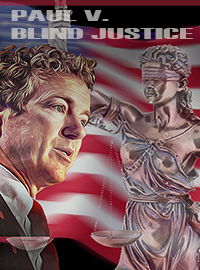| Rand Paul Announces Judicial Policy That Should Alarm Conservatives and Libertarians |
 |
|
By Timothy H. Lee
Thursday, January 22 2015 |
As his prospective 2016 presidential candidacy congeals, Senator Rand Paul's (R - Kentucky) discordant policy proclamations have so far tended toward the realm of foreign affairs. In recent remarks before a Heritage audience, however, Paul announced a domestic judicial philosophy that will exacerbate concern among conservatives and libertarians that he's ideologically and temperamentally unfit for the White House. Specifically, Paul openly proclaimed, "I am a judicial activist." Applying his concept of judicial activism, he proceeded to assert that judges should overturn what he labels "bad things" and "wrong" laws. He even explicitly defended one of the most discredited decisions in U.S. Supreme Court history, Lochner v. New York (1905). That raises grave questions concerning a man who would be empowered to nominate judges and justices if elected president. By way of background, Lochner involved a straightforward New York law regulating working hours and conditions for bakers, something that most of us today rightfully accept as well within the power of elected legislatures to govern. The Supreme Court, however, curiously held that the law interfered "with the right of contract between the employer and employees," because, "the general right to make a contract in relation to his business is part of the liberty of the individual protected by the Fourteenth Amendment of the Federal Constitution." The Court concluded, "The freedom of master and employee to contract with each other in relation to their employment ... cannot be prohibited or interfered with, without violating the Federal Constitution." The problem with that holding is clear to anyone familiar with the Constitution and the Fourteenth Amendment. Namely, the text of the Constitution contains no such "right." Instead, the majority simply reached its decision based upon a policy preference rather than applying any actual provision of the Constitution. Under their logic, almost any federal, state or local law relating to labor and employment conditions could be overturned depending on particular judges' political views. Here's why Lochner still matters. Its judicial logic undermines the very nature of our Constitution and system of laws. When judges consider themselves empowered to overturn statutes on the basis of their policy viewpoints rather than more explicit textual provisions of the Constitution, we become a nation of men rather than laws, a judicial oligarchy rather than a constitutional republic. Our Founding Fathers deliberately and carefully drafted the Constitution to establish a government based upon separation of powers between the branches, as well as between the federal government and states. The Founders believed that such a separation and balance of powers was the optimal way to protect individual liberty against a tyranny of the majority, while also protecting democratic majorities against a tyranny of the minority. Rand Paul's judicial philosophy would upend that careful balance and separation of powers. A judge's proper role in our system is to overturn unconstitutional laws, not merely disagreeable laws. Under Rand Paul's preferred system, however, judges should overturn whatever they consider to be "bad things." "I think the court has a duty to overturn anti-liberty laws," he asserts. No, it doesn't. As much as conservatives and libertarians oppose and even detest "anti-liberty laws," the court has a duty to apply the Constitution and laws in question as objectively as possible. We cannot in good faith advocate overturning "anti-liberty laws," but then protest when liberal judges overturn "pro-liberty laws" or other statutes perfectly compatible with the Constitution. To be sure, there is obviously and inescapably some grey area in this regard, which is why we need a judicial branch and judges in the first instance. Close calls do exist, when straightforward application of legal text is extremely difficult. But to openly advocate that judges overturn "bad things" is unwise and ultimately dangerous. Our system of government generally allows majority democratic rule, with specific exceptions preserved from potential majority oppression such as freedom of speech, the right to keep and bear arms, equal protection under the law and so on. We protect several sacred rights against majority rule, but by the same token we don't want potential minority oppression in which majorities cannot rule. We also disfavor a nation ruled by five judges, which Rand Paul's announced judicial philosophy would encourage. He cannot on one hand lament the dictatorial executive branch under Obama, but then turn around and advocate what would amount to a dictatorial judicial branch. Senator Paul offers a fresh perspective and valuable ideas as both a Senator and potential presidential candidate. Unfortunately, he continues to behave in a manner that raises justifiable concern among conservatives and libertarians that he's ultimately unfit for that higher office. |
Related Articles : |
























